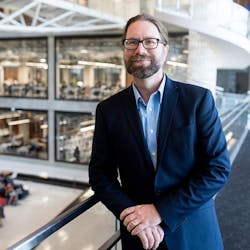Aligning Education Pathways to Jobs Skills Needed
Eric Roe always felt he would remain in the field he loved — manufacturing.
Beginning his career at Tropicana, and going to community college at night to earn advanced degrees, he envisioned a meaningful career in his chosen field. Roe had left college to extract juice samples at a Tropicana factory as part of their research and development team. He went on to earn his Ph.D. in Chemical Engineering at the University of South Florida.
But it seems as though fate had a different course for him. An opportunity to work with the University of South Florida and a couple of community colleges to develop workforce strategies was too tempting to pass up.
“I have a unique perspective in that I came from manufacturing and had also spent years in education earning higher degrees, so I was the link between the two sectors,” said Roe, whose current position is that of Dean of the College of Professional Studies at National University. “This led the task force to understand that we need to create clear unified pathways for the development of the skills the workers need for their careers.”
Roe founded the statewide Florida Manufacturing Talent Development Institute. At that time, he was the director of applied technology at Polk State College. He also originated one of the first public competency-based degree programs, which transformed a traditional engineering technology course of study into a competency-based open-entry/early-exit program.
Shifting Education Requirements
While education in manufacturing has improved over the years, Roe saw blaring issues. “The degrees that students are earning need to be aligned to industry needs,” he says. “That has been the disconnect. We need to have a conversation about what employers need and what programs the educational institutions are offering."
Over the past ten years, Roe feels that industry certification has been key in moving education forward. “If we can take these certifications and stackable credentials and map them to a degree it gives the schools a way to articulate the depth of the education. And employers need to recognize the value of these certifications in their hiring and promotion process.”
Meet Learners Where They Are
And helping employers do that is part of his current role at the National University. The student population is comprised of people who are over the age of 25 and a large number are veterans as well. In fact, the university was founded in 1971 by retired U.S. Navy Capt. David Chigos. It is San Diego’s largest private nonprofit university, offering 75 degree programs and tuition discounts for military personnel and their dependents.
One of the features of both the military program and other programs is that it’s tailored to the schedule of the students. “We designed the program to meet the learners where they are,” says Roe. "We have non-traditional semesters, as these students don’t need long, 15-week programs, as many are working. We have 4-week terms so students can concentrate on learning exactly what they need for their jobs. They get in there and get it done.”
This strategy of designing learning that is more based on students’ needs, rather than traditional academic institutions' methods is essential, says Roe. “We designed programs that are right-sized, based on industry needs in a modality that services the adult learner. This is why we are successful.”
Industry Collaboration
It was this success that inspired Amazon to partner with the university. On March 3, 2022, Amazon chose National University, which is part of the National University System and is comprised of three universities serving more than 45,000 students, as a national provider for the company’s Career Choice program. The program, which offers full tuition to learn new skills for career success, will now include offerings for more than 40 bachelor’s and associate degree programs offered by National University.
“Employee education benefits can help pave the way for workers to access higher-paying and more fulfilling careers—but investing in upskilling also has the dual benefit of strengthening retention and giving employees the chance to refresh their skill sets or train for a new role in a different part of the company,” said Michael R. Cunningham, chancellor of the National University System. “Companies are realizing that the well-being and success of their employees and business returns are really two sides of the same coin.
“More than 90% of our students are over the age of 25, and 30% are active-duty military or veterans. Part of what drew us to this partnership with Amazon was the common interest in serving military veterans. Amazon has set an ambitious goal of hiring thousands of veterans and military spouses. The Amazon Career Choice engagement provides us with a unique opportunity to reach even more current and former military men and women and support them on their transition to civilian career paths.”
In keeping with its desire to meet learners where they are, National University will offer new start dates every month through flexible courses designed to be completed in four weeks. Every student who enrolls in NU courses through Amazon Career Choice will be paired with an academic advisor throughout the experience — along with career counseling and job placement services to help them prepare for opportunities in their industry or career of choice.
The pairing of Amazon and National University is exactly how Roe wants to see industry and education work together. “We have an opportunity in education to make sure that we align with industry and offer the right type of certification to help employees advance within their career.”
Roe notes that lifetime learning is now the norm. Popularized in the Harvard article, “The 60-Year Curriculum: A Strategic Response to a Crisis,” the updated theory argues that the traditional way we view learning in three phases: school, work and then retire, isn't correct. “Now we move from one career to another, or we might become entrepreneurs and then go back to the workforce, all the while adding to our skill sets. And the education sector has to adapt to this new reality. At the same time, employers need to be involved in expanding access to education as workplace skills change quickly.”

